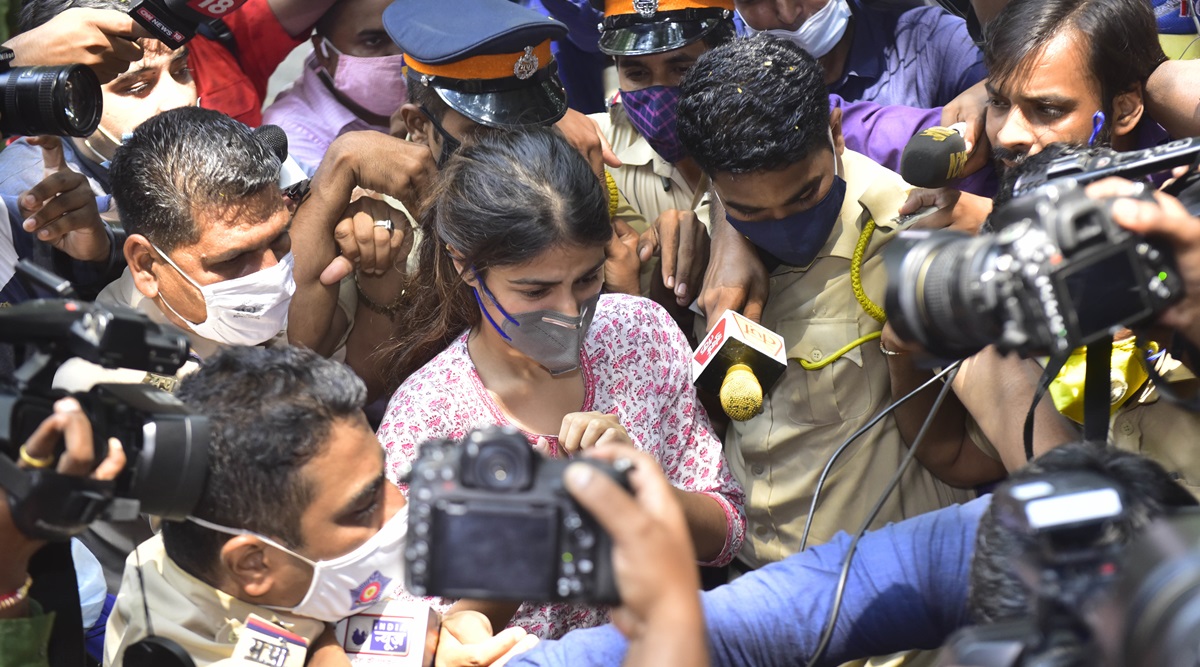 Media personnel surround actor Rhea Chakraborty as she arrives at Narcotics Control Bureau (NCB) office for questioning, following the death of her boyfriend and actor Sushant Singh Rajput, in Mumbai. (Express Photo)
Media personnel surround actor Rhea Chakraborty as she arrives at Narcotics Control Bureau (NCB) office for questioning, following the death of her boyfriend and actor Sushant Singh Rajput, in Mumbai. (Express Photo)The Bombay High Court on Thursday sought to know from the central government as to why there was no state regulation on the electronic media and asked media channels to follow its previous order of maintaining restraint while reporting on the Sushant Singh Rajput case.
The court also directed that the Enforcement Directorate (ED) and Narcotics Control Bureau (NCB) be made parties to the public interest litigations (PILs), including one filed by eight former senior police officers of Maharashtra, seeking restraining orders against “media trial” in the case. The court was told that the news relating to the investigation in the case was being leaked to the media by the investigating agencies.
A division bench of Chief Justice Dipankar Datta and Justice G S Kulkarni directed the Centre to indicate extent of state control exercised in respect of telecasting news having serious ramifications & other ancillary matters which might come up while deciding PILs.
The Union Information and Broadcasting Ministry submitted that the question of media trial in the case was referred to News Broadcasters Association (NBA) for probe and that the government also has an inter-ministerial committee to review decisions of NBA after the complaint is dealt by the association itself.
Senior counsel Milind Sathe argued that despite the court’s order that appealed restraint by the news channels, some media outlets were becoming more vociferous and conducting ‘vilification’ campaigns against Mumbai Police and produced transcripts of certain TV news items in support of his claims. He said that the Supreme Court had not passed any adverse comments against the Mumbai Police and the HC should take cognizance and make the channels respond to the plea.
To this, CJ Datta said, “The Supreme Court order about Mumbai Police will prevail. What is so objectionable here? Why should you consider what the news anchor is saying and how can we stop that?” Stating this, the court said that NBA decide the complaints first.
Senior advocate Devadatt Kamat concurred with Sathe’s submissions and while agreeing to the CBI’s submissions that they were not leaking any information to the media, Kamat said ED and NCB be made parties to ascertain whether the information was being leaked through them.
The News Broadcasting Standards Authority (NBSA) through advocate Nisha Bhambhani, an independent body, submitted it had received complaints from viewers about misreporting in the death case by some news channels. She said that authority was looking into the complaints and would put on record the action taken by it, which the court allowed.
The bench said, “Pendency of these pleas shall not preclude the NBSA to consider complaints that have been received by it and to take appropriate action thereon in accordance with law. The resultant decision of the NBSA may be incorporated in the affidavit to be filed.”
After advocate Asim Sarode sought directions to authorities to put regulatory mechanism on functioning of media, CJ Datta said, “We are surprised to find there is no state control over electronic media. This body (News Broadcasting Standards Authority) has no teeth at all is our prima facie view.”